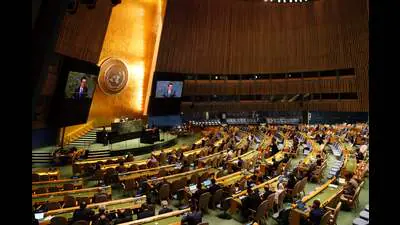G20 Summit: As leaders from the world’s most powerful countries convened for the annual G20 summit in New Delhi, delegates have reached a “compromise” on the language used to describe the war in Ukraine, according to a source knowledgeable about the discussions.
Nations divided on Russia-Ukraine war
The 20-nation coalition remains significantly divided regarding the conflict in Ukraine. Western nations advocate for a robust condemnation of Russia, whereas Moscow, supported by its ally China, seeks to diminish international criticism of its “special military operation,” creating a substantial obstacle to unified action.
The circulated 38-page draft among members notably left the “geopolitical situation” paragraph vacant, despite reaching consensus on the other 75 paragraphs, covering topics such as climate change, cryptocurrencies, and reforms in multilateral development banks.
Draft sent to Russia for inputs
G20 sherpas have been engaged in prolonged negotiations to reach a compromise on the language surrounding the war due to divergent views, with the hope of gaining Russia’s cooperation to draft a communique. According to a senior source from one of the G20 countries, the paragraphs concerning the conflict in Ukraine had already received approval from Western nations and were subsequently sent to Russia for its input.
The source indicated that Russia had the choice to either accept the perspectives of the Western countries and express its dissent within the statement or provide alternative views. In the event of a failure to reach an agreement, India would be required to issue a chair statement. This would mark the first time in the 20-year history of G20 summits that the group would not release a declaration.
Unanimous agreement on war
According to sources, the joint declaration might or might not achieve unanimous agreement. It could potentially include different sections outlining the perspectives of various countries, or it might summarize both agreement and dissent within a single paragraph.
Nonetheless, achieving compromise on the joint communique is notable, especially given that two influential heads of state, Russian President Vladimir Putin and Chinese President Xi Jinping, have chosen not to attend the summit. Instead, Russia is represented by Foreign Minister Sergei Lavrov, and Xi Jinping has delegated Premier Li Qiang to represent China.
Keep watching our YouTube Channel ‘DNP INDIA’. Also, please subscribe and follow us on FACEBOOK, INSTAGRAM, and TWITTER.












